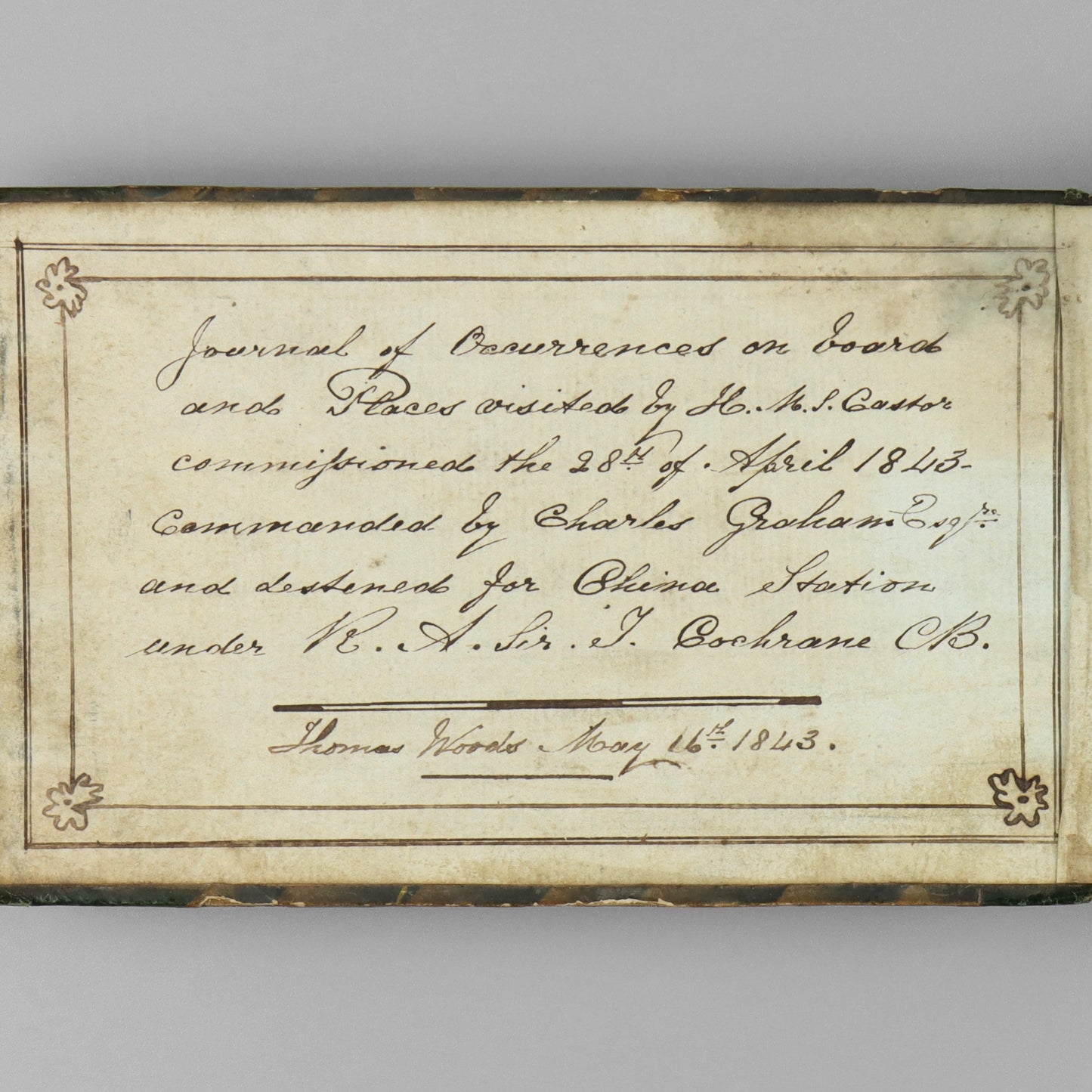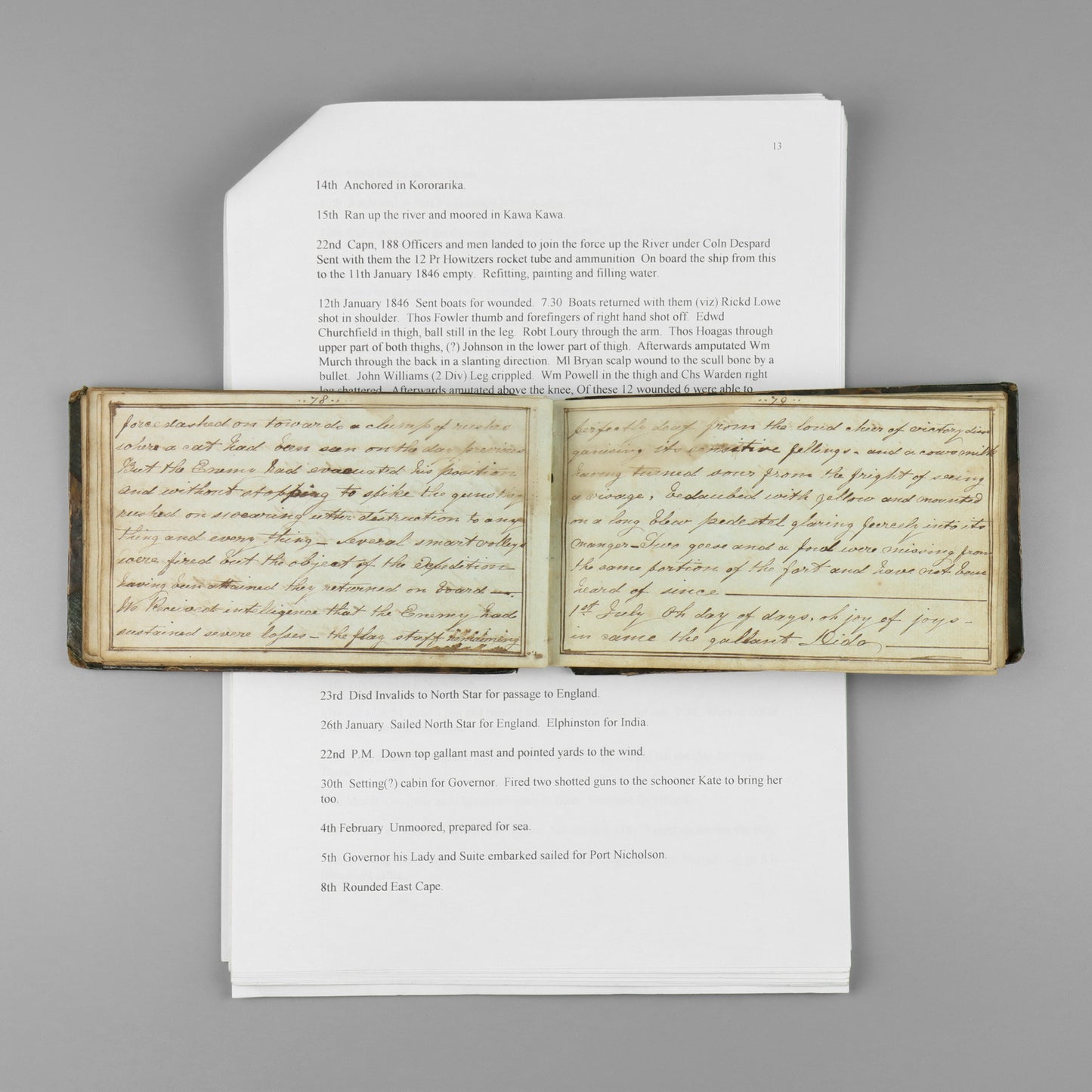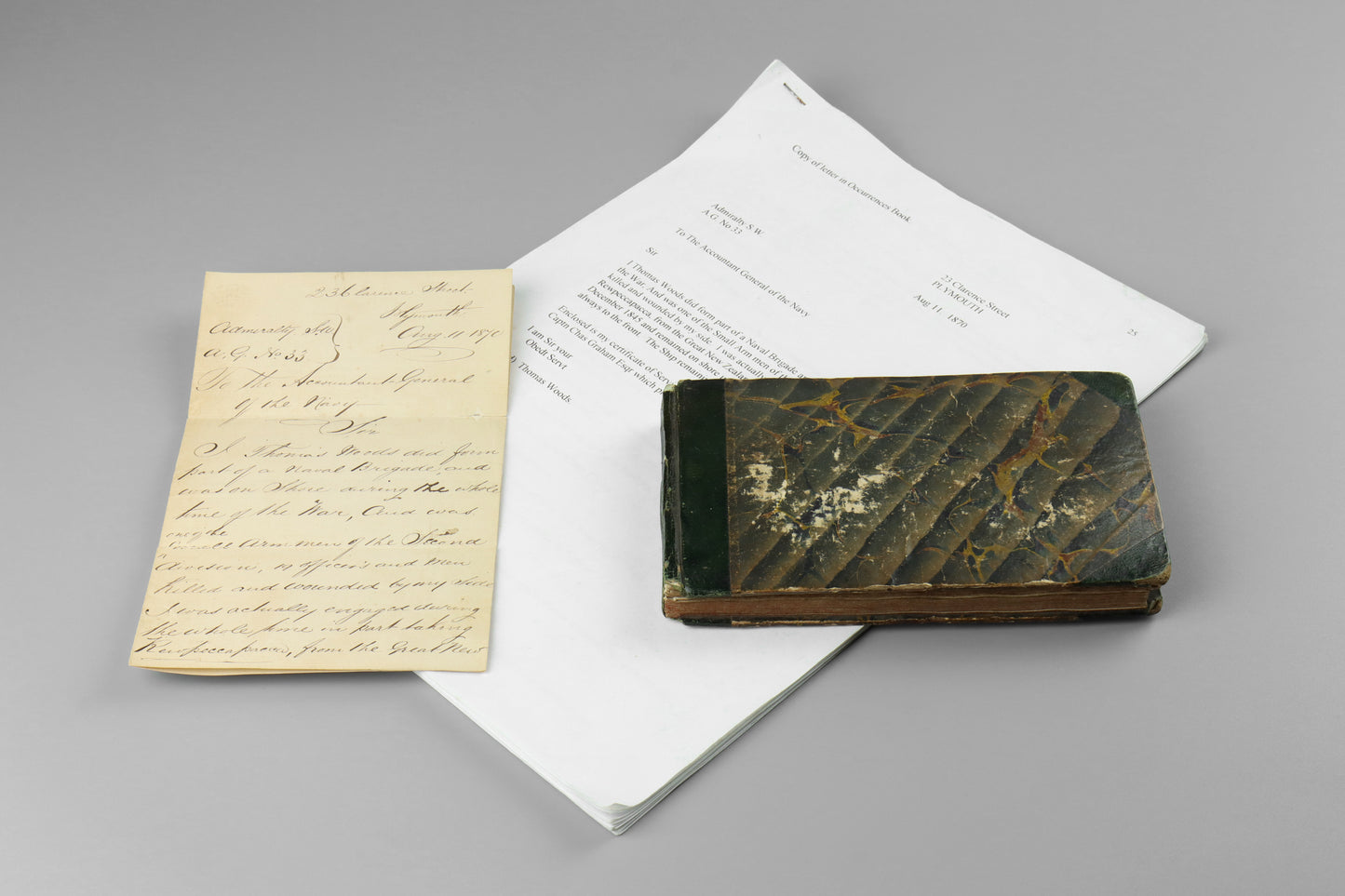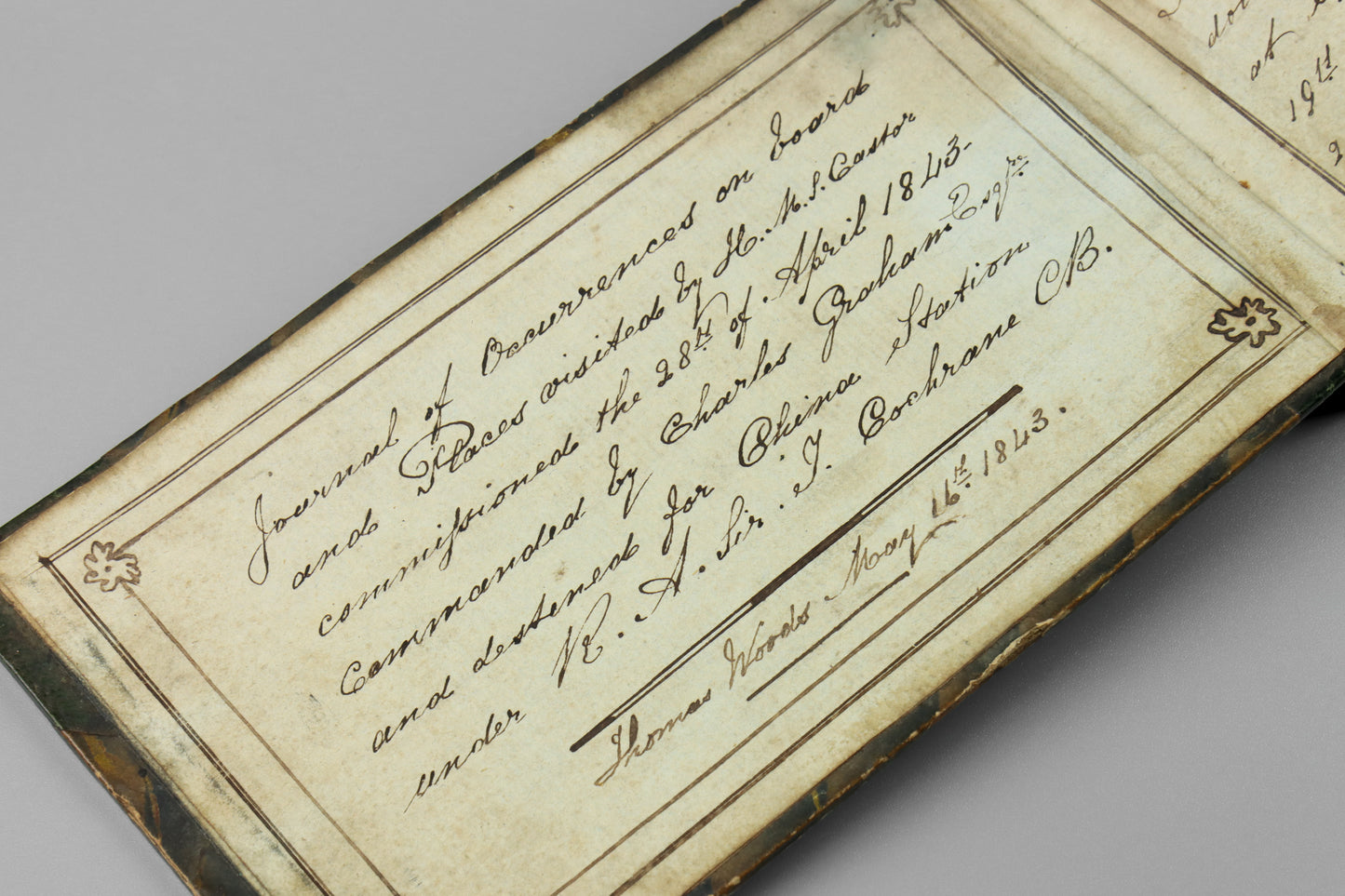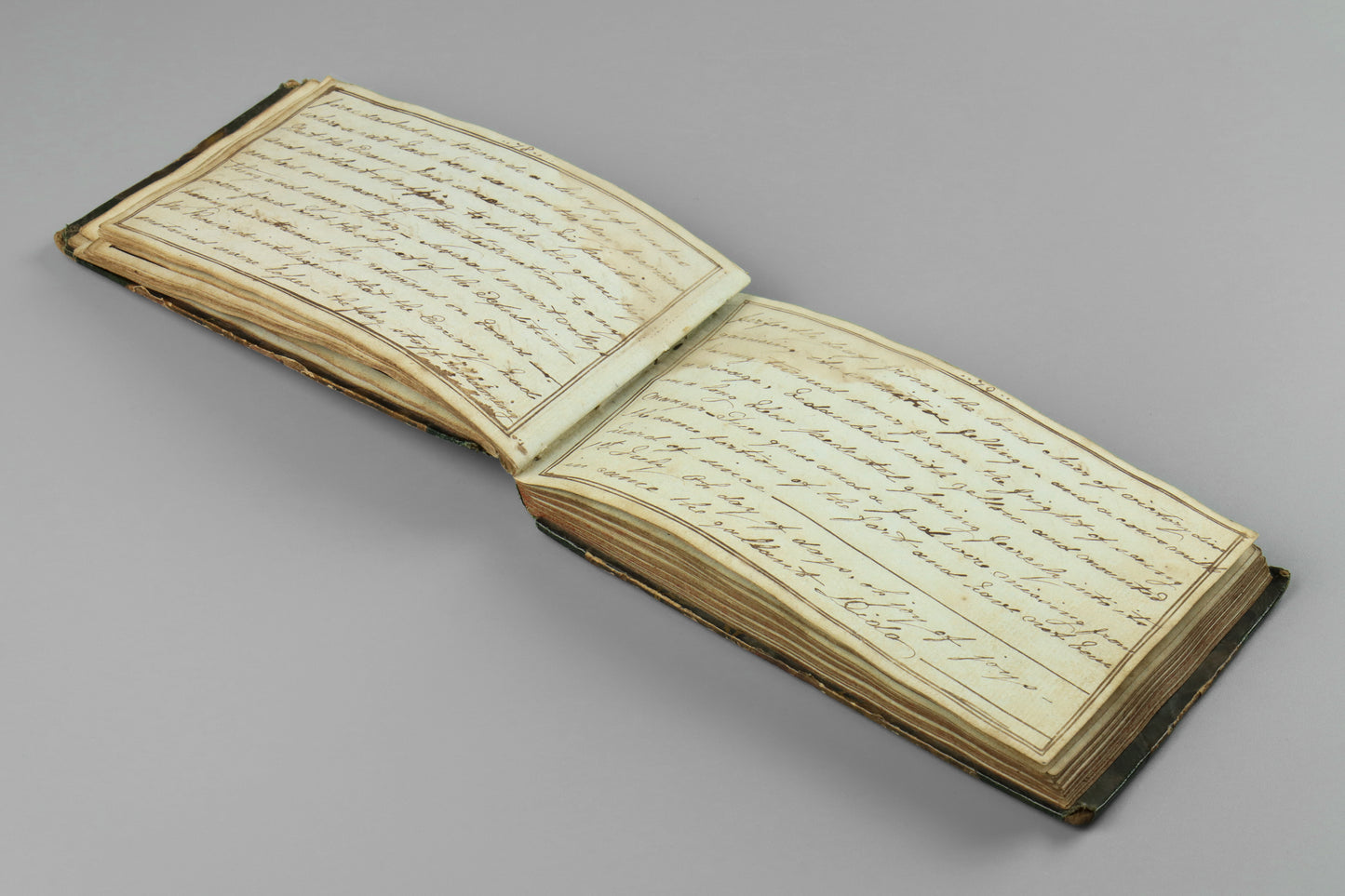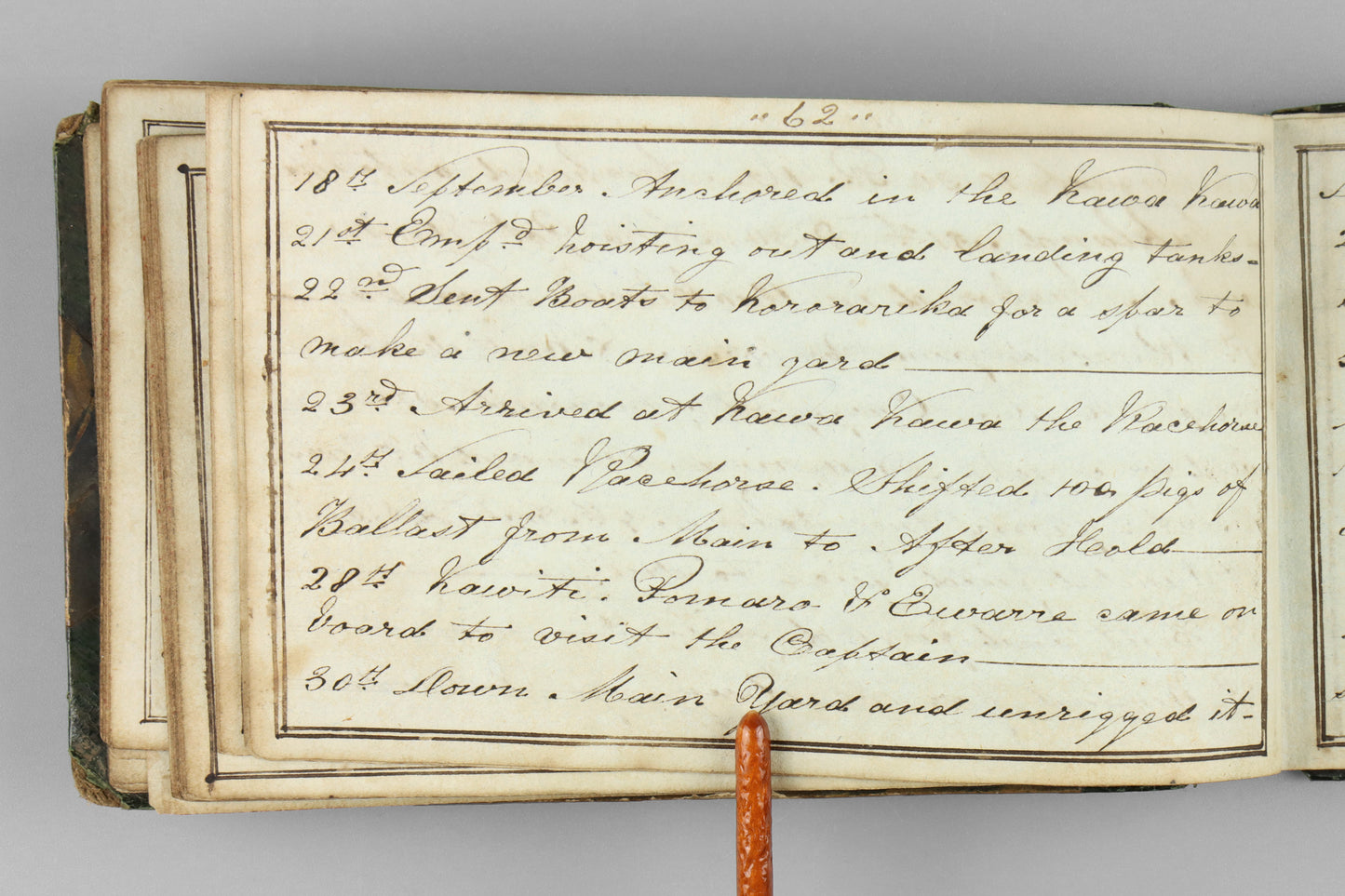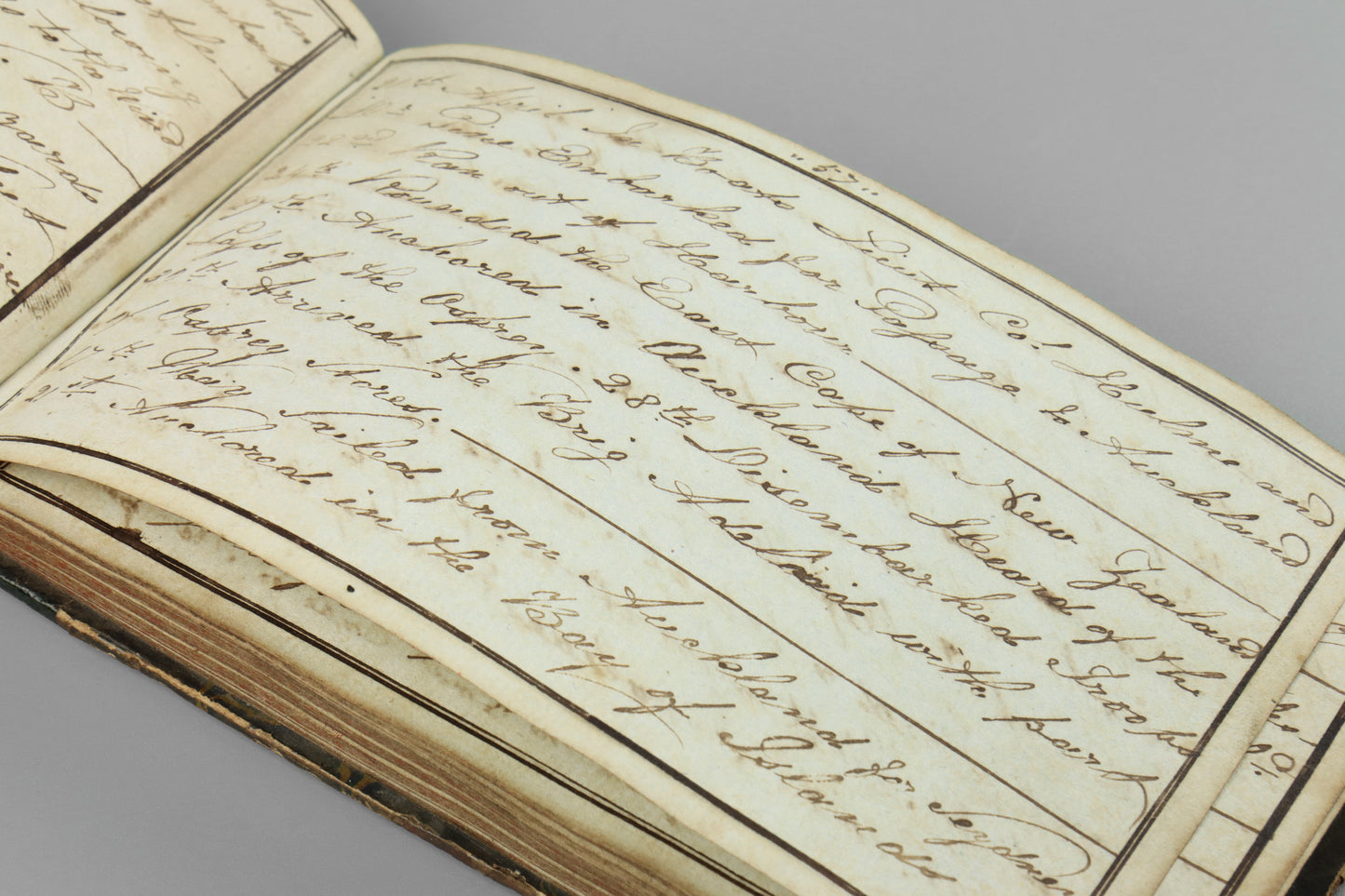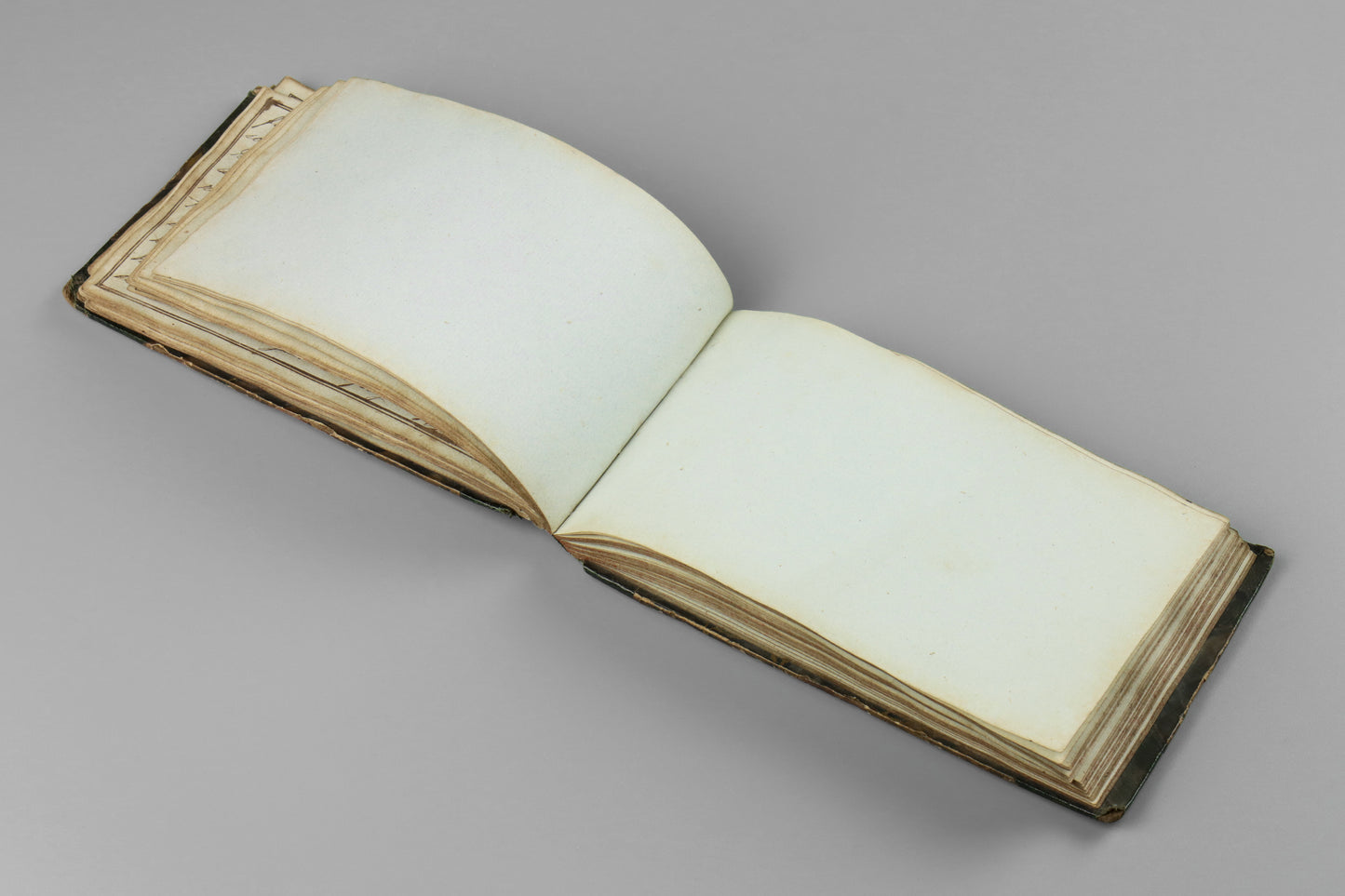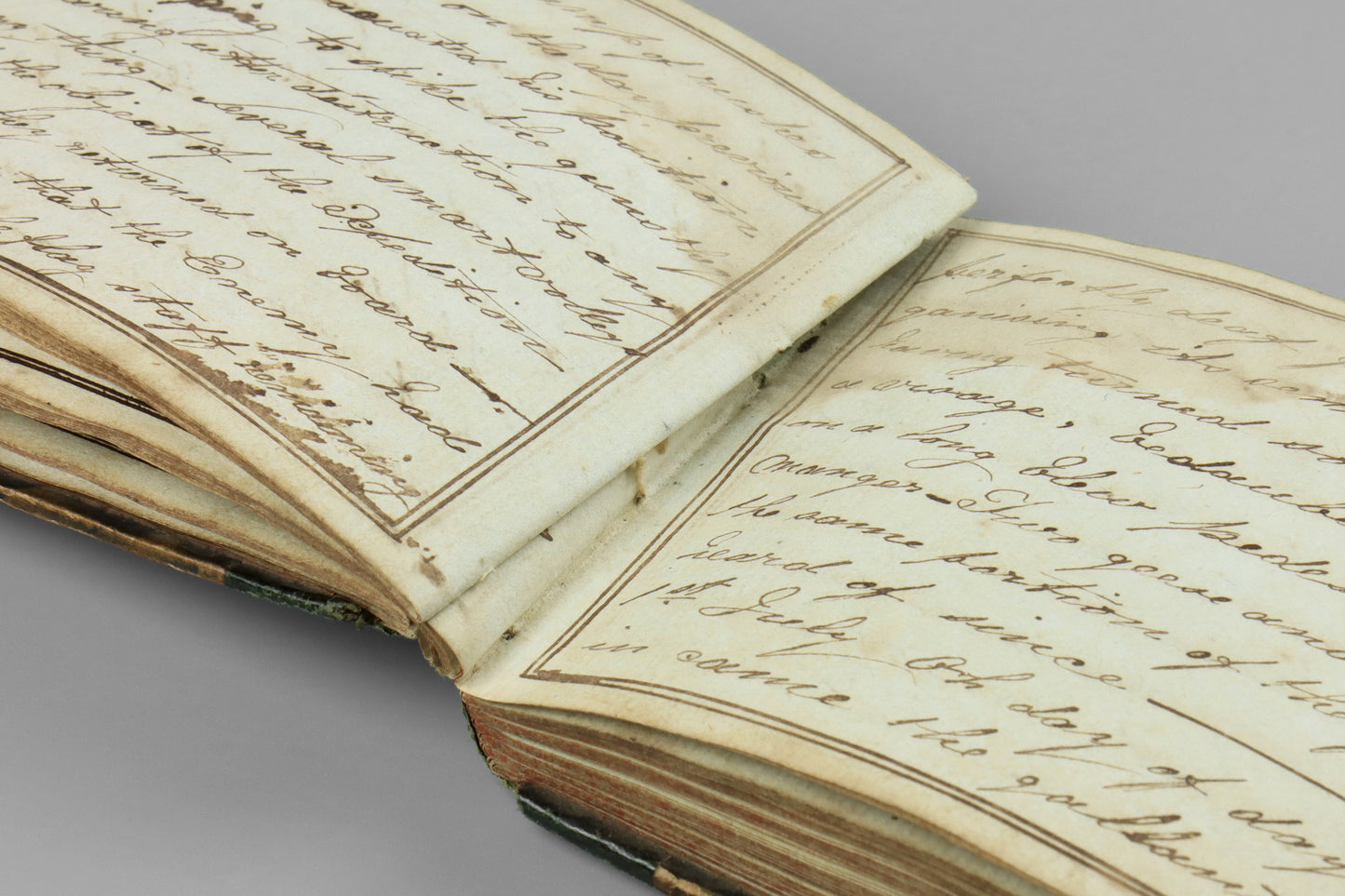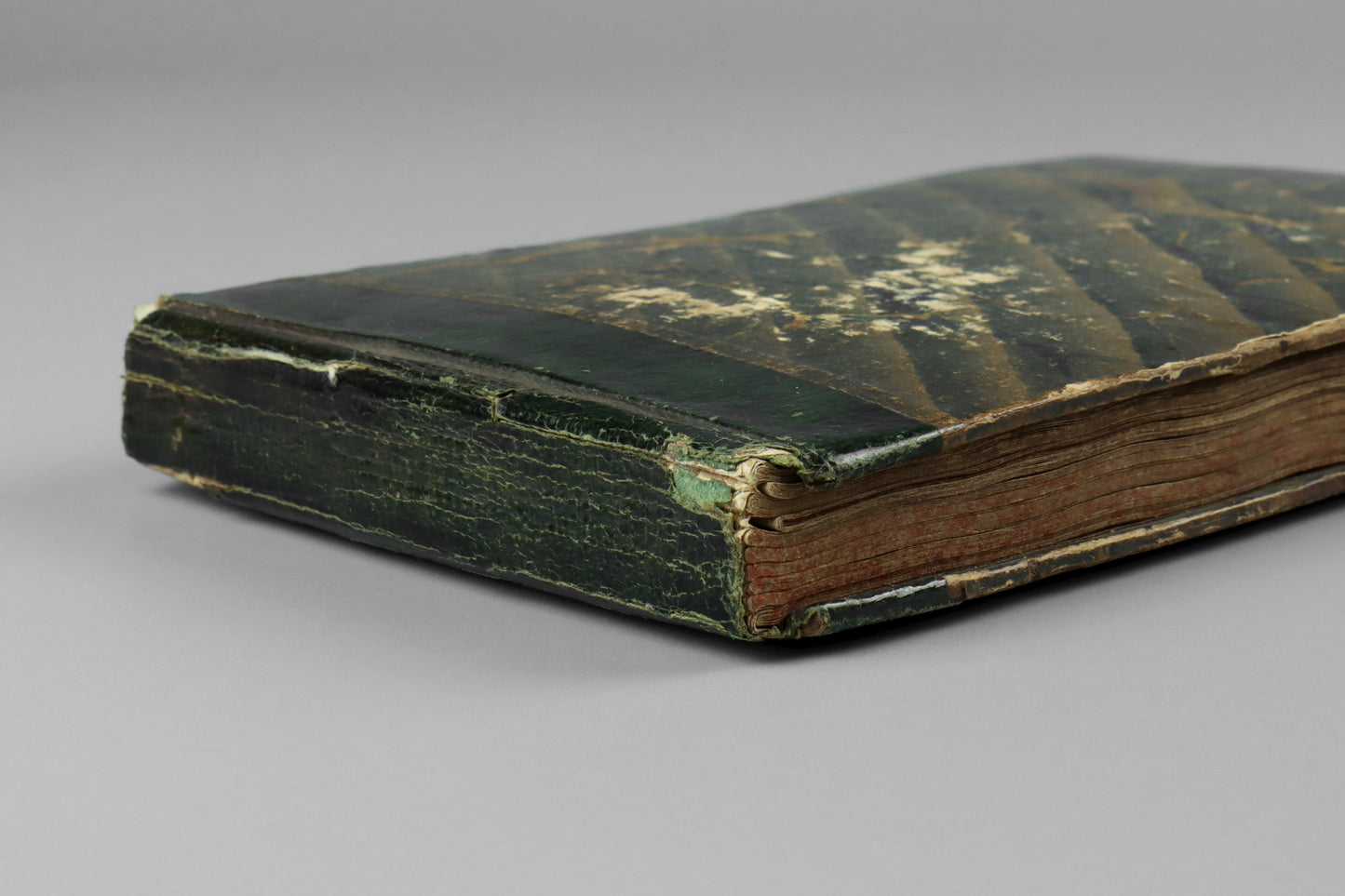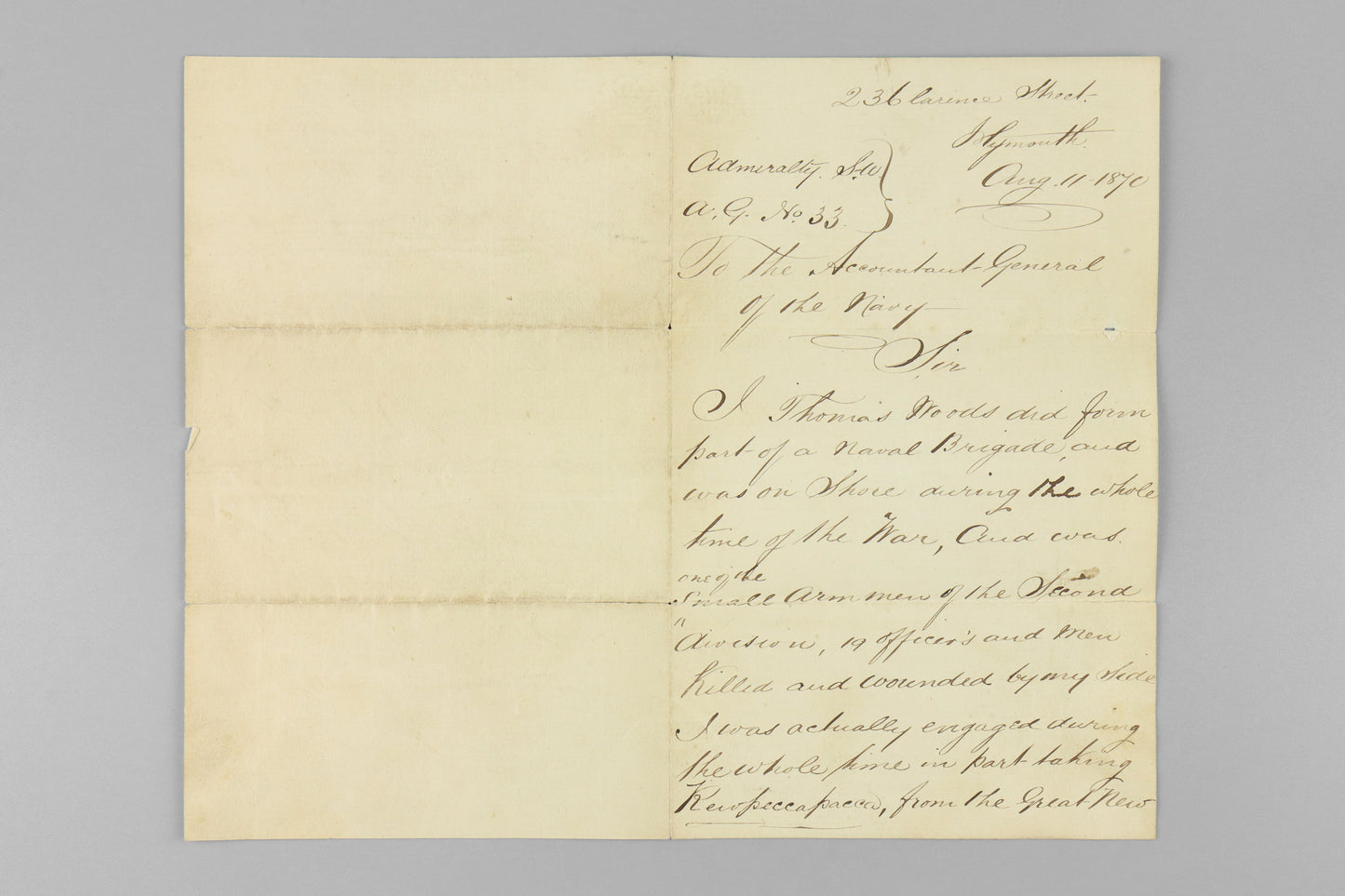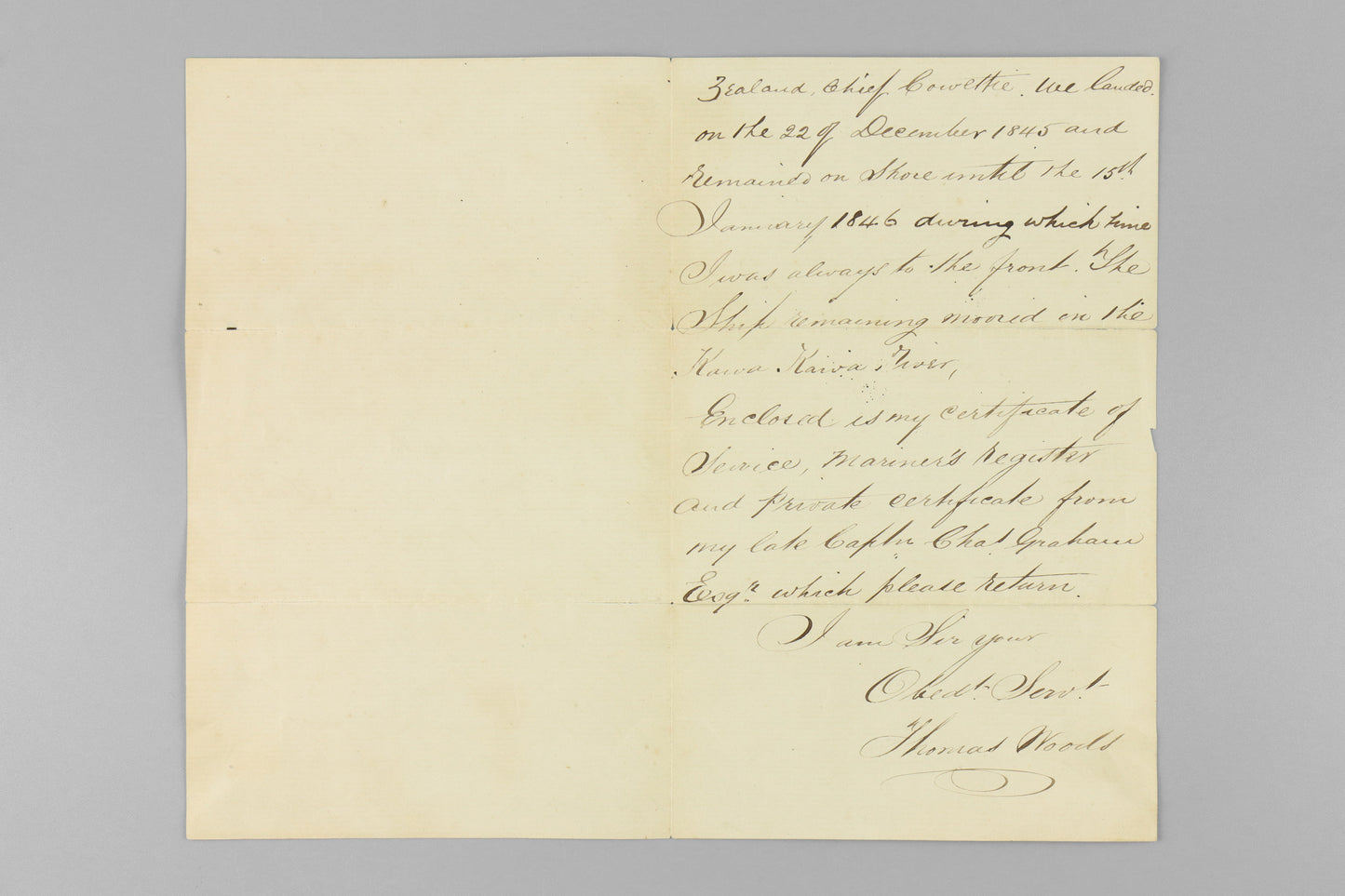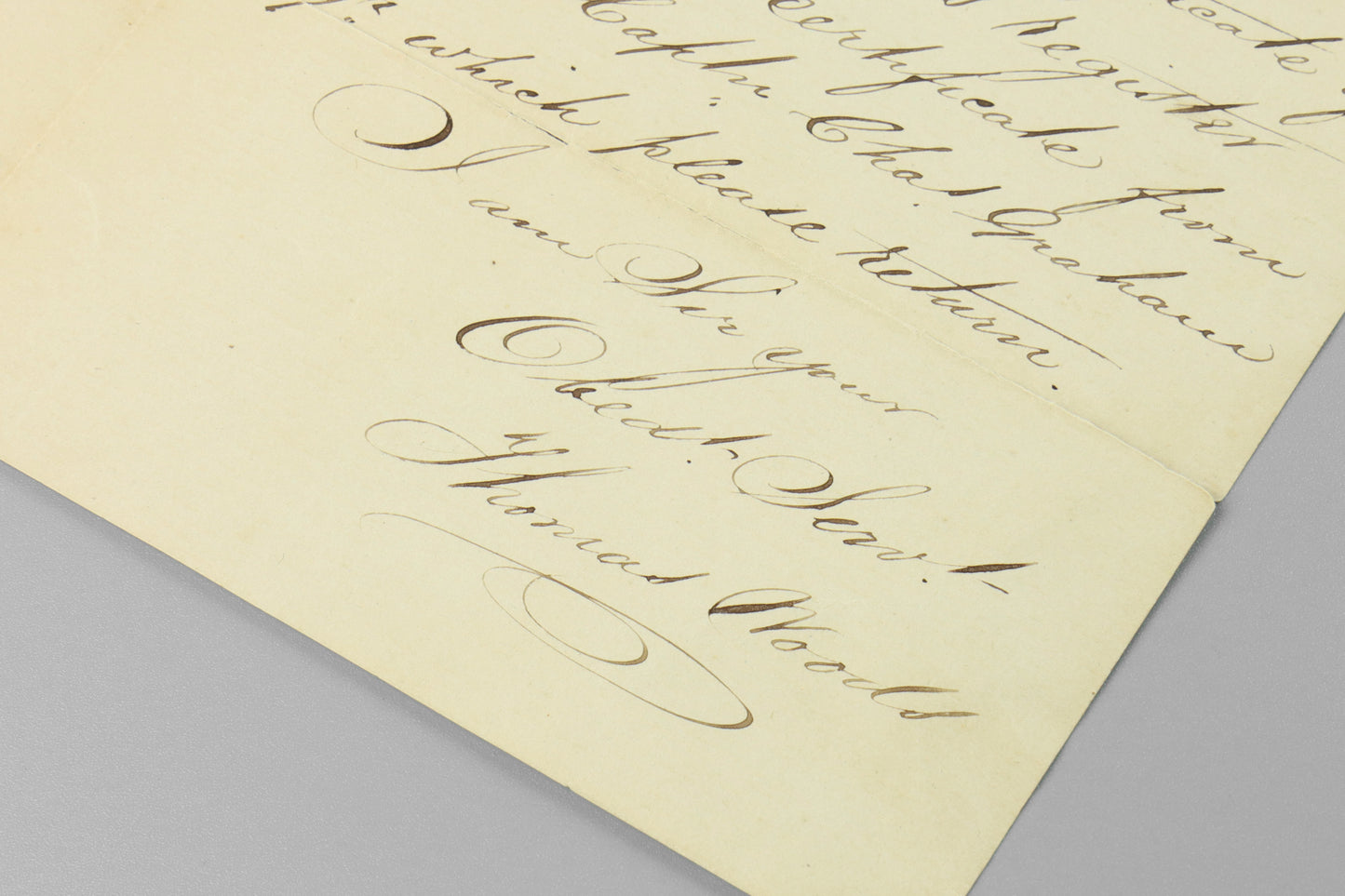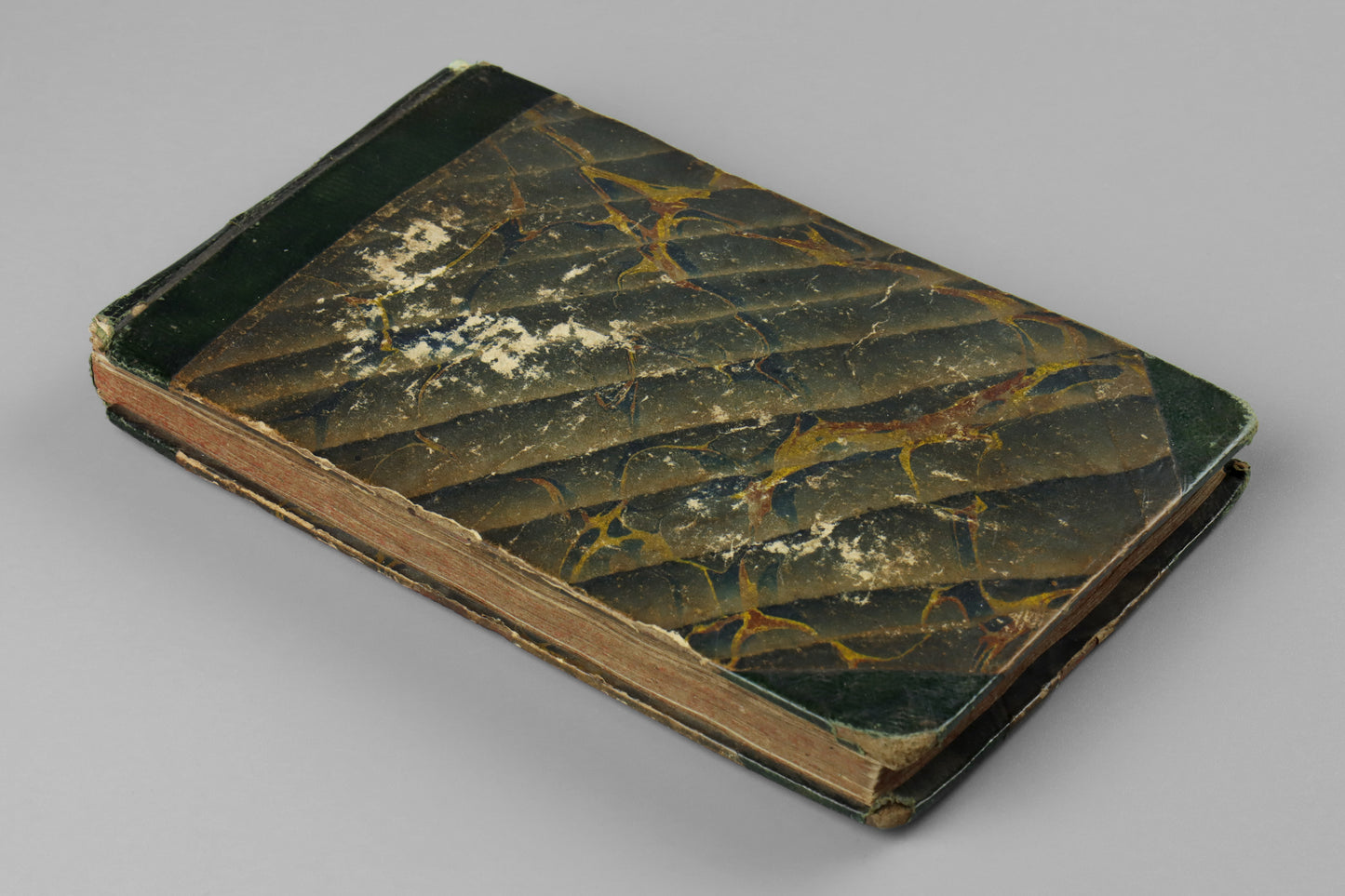Maori Wars - HMS Castor Log Book
Maori Wars - HMS Castor Log Book
Couldn't load pickup availability
Description:
“Journal of Occurrences on board and places visited by HMS Castor commissioned the 28th of April 1843. Commanded by Charles Graham Esqr and destined for China Station under R A Sir T Cochrane CB.”
This hand written “Journal of Occurrences” by Thomas Woods (accompanied by a recent printed transcript) details over 4 years and 3 months on board HMS Castor, beginning in England July 7th 1843, arriving in China 27th December 1843 until 27th September 1844. Arriving in New Zealand 10th December 1844 until 8th July 1847. The journal ends on the 5th September 1847 in Rio de Janeiro on the voyage back to “home sweet home” (England).
An interesting letter addressed to The Accountant General of the Navy, dated Aug 11 1870, that details Thomas Woods' involvement in the Flagstaff War is folded within the book.
This book is interesting and important due to the first hand account of the Flagstaff War, one of the first of the New Zealand Wars. Also known as Heke's War, Hōne Heke's Rebellion, and the Northern War, fought between 11th March 1845 and 11th January 1846. The conflict is remembered for the actions of Hōne Heke who challenged the authority of the British by cutting down the flagstaff on Flagstaff Hill (Maiki Hill) at Kororāreka.
There are two entries within the journal that documents specific conflicts, the first is during the Flagstaff war (page 13 of transcript):
“13th (Decmber 1844) Weighed for the Bay of Islands the seat of war.
14th Anchored in Kororarika.
15th Ran up the river and moored in Kawa Kawa.
22nd Capn, 188 Officers and men landed to join the force up the River under Coln Despard Sent with them the 12 Pr Howitzers rocket tube and ammunition On board the ship from this to the 11th January 1846 empty. Refitting, painting and filling water.
12th January 1846 Sent boats for wounded. 7.30 Boats returned with them (viz) Rickd Lowe shot in shoulder. Thos Fowler thumb and forefingers of right hand shot off. Edwd Churchfield in thigh, ball still in the leg. Robt Loury through the arm. Thos Hoagas through upper part of both thighs, (?) Johnson in the lower part of thigh. Afterwards amputated Wm Murch through the back in a slanting direction. Ml Bryan scalp wound to the scull bone by a bullet. John Williams (2 Div) Leg crippled. Wm Powell in the thigh and Chs Warden right leg shattered. Afterwards amputated above the knee, Of these 12 wounded 6 were able to return to duty the remainder were invalided.
14th January Lieut Falcon Mr Murray (Mod) and 80 men returned from the Camp.
15th Saw rmainder of Officers Seamen and Mariners returned from the Camp.
16th Preparing for sea and boats embarking troops.
18th Unmoored and shortened in to 24 fms on S.B. Sailed the Brig Victoria.
18h Jany Hove too for Master of Colonial Brig Victoria who bring the Dispatches from Hookinga.”
The second related entry recorded on June 1847 (after the main Flagstaff war?) documents another conflict (page 21 of transcript):
“30th June Grand Field Day - Small arm Men Field Piece and Marines with three cheers under the cover of the fire of our Main Deck Guns to storm the canvas port on the North Shore garrisoned by the Dog Bran - It was gallantly defenced but what could resist the onset of 200 British Seamen - It was taken and the invading force slashed on towards a clup of rushes where a cat had been seen on the day previous. But the enemy had evacuated his position and without stopping to spike the guns they rushed on swearing utter destruction to anything and every thing - Several smart volleys were fired but the object of the expedition having been attained they returned on board. We received intelligence that the enemy had sustained severe losses - the flag staff remaining perfectly deaf from the loud cheer of victory disguising its sensitive feelings and a cows milk having turned sour from the fright of seeing a visage, bedaubed with yellow and mounted on a long blew pedestal glaring fiercely into its manger - Two geese and a fowl were missing from the same portion of the fort and have not been heard of since.”
A letter from Thomas Woods (author of the book) addressed to The Accountant General of the Navy, dated Aug 11 1870, accompanies the book. It states:
“Sir
I Thomas Woods did form part of a Naval Brigade and was on Shore during the whole time of the War, And was one of the Small Arm men of the Second Division, 19 Officers and men killed and wounded by my side. I was actually engaged during the whole time in part taking Rewpeccapacca, from the Great New Zealand Chief Cowettie. We landed on the 22 of December 1845 and remained on shore until the 15th January 1846 during which time I was always to the front. The Ship remaining moored in the Kawa Kawa River.
Enclosed is my certificate of Service, Mariner's Register and Private Certificate from my late Captn Chas Graham Esqr which please return.
I am Sir your
Obedt Servt
(sgd) Thomas Woods.”
As well as the important first hand account of the war, the book is filled with interesting and amusing events (and not so amusing such as the dozens of deaths recorded on board), such as:
“14th (Sept 1843). Caught a Shark 7 feet in length”
“21st. (Dec 1843). Witnessed a total eclipse of the Sun.”
“25th (Jan 1844). Court Martial held on board Castor on a Marine belonging to H.M.B. Childers for embezzling part of the Chinese ransom money.”
“28th (Sept 1846). Kawiti Pomuro and Ewarre came on board to visit the Captain.”
“10th (Oct 1846) Bent and furled sails. The Chief Hike sent a present to the Governor in the Elegant shape of a Pig.”
“24th (May 1847). There was to have been a ball on this anniversary of H.M. birthday, great preparations both in decorations and practising steps, cooking, &c having been made - but the New Zealand God of the Weather had made up his mind that it should not take place that day and was half resolved it should not on the next - But he relented and the consumption of grub and fluids was astonishing not omitting the wind that was thrown away by the band.”
“20th (July 1847). Heavy gale close reefed mitten and so forth. 8.45 P.M. Port clew of main topsail carried away - Main Topmen laid aloft to furl the sail when Poor Dick Sullivan in laying out on the yard fell from it the sail having dashed him off and he was literally dismembered from the fall every bone in his skin being broken and skull crushed like an egg shell. Poor fellow he was much esteemed by those who knew him intimately and generally respected by all. 21st July Gale still raging. The deep tolling of the bell prolonged upon the gale announced to us all that the "last scene of all" was about to be enacted. The Chaplains voice as he read that beautiful service of the church, in whose echo the body descends to eternity, sounding clearly above the howling gale and the raging billow. The sullen plunge of the corpse at the words "We commit his body to the deep" the assembled ships company uncovered, and the knowledge that but a few short hours before he had conversed with us strong in health and high in spirits anticipating the pleasures of that home he was doomed never to return to - all conspired to render the ceremony solemnly instructive - In the midst of life we are in death". These words thrilled upon the ear prophetically distinct as they soared above the tempest when uttered by the Clergyman at out last farewell of all that remained of Poor Dick - Do we ever cast a thought upon that unwelcome subject Death, or do we ever transplant the warnings we daily receive to our future lives - Perhaps not, but in our gayest hours of dissipation when the song the laugh and jest goes round ringing the merry tocsin (?) of gladness among us in Home Sweet Home, the wan pallid features of poor Sullivan in his death shroud will flit gory and ghastly before our minds eye for the moment, and long, long will it be however varied the scenes of life we may pass through before the remembrance of that night fades from our memory.”
The book is approximately half filled with 94 pages of writing. The remaining half of the book is left as blank pages.
The author of the book, Thomas Woods, currently remains a mystery. I am unable to find any records in the National Archive or other similar databases.
A digital version of the transcript is available by request. Please contact me for further information.
Dimensions:
Closed: Length: 16.2cm. Height/Width: 9.8cm. Thickness: 1.7cm.
Open approx 32.8cm across.
The letter unfolded: 18cm x 23.2cm.
The printed transcript is A4 size.
Condition:
Surface wear to front and back cover. Knocks to corner edges. Slightly weak spine. Some pages are coming loose from spine but are still attached – appears they should be held together by two pieces of string bound to spine but the affected pages are only held by one piece – please see photos. Some light staining throughout. The letter is folded and some of the fold creases are torn. Age related wear as expected. Please examine photos carefully.
Postage:
Calculated at checkout.
Item will be sent tracked and signed-for.
For all overseas purchases please note that any import duties or taxes applicable are payable by the buyer. Do not ask me to falsify customs documents. Antiques (greater than 100 years old) often have reduced rates of duty to be paid. Please familiarise yourself with your own country's tariff rates, rules, legislation and exemptions.
Share
